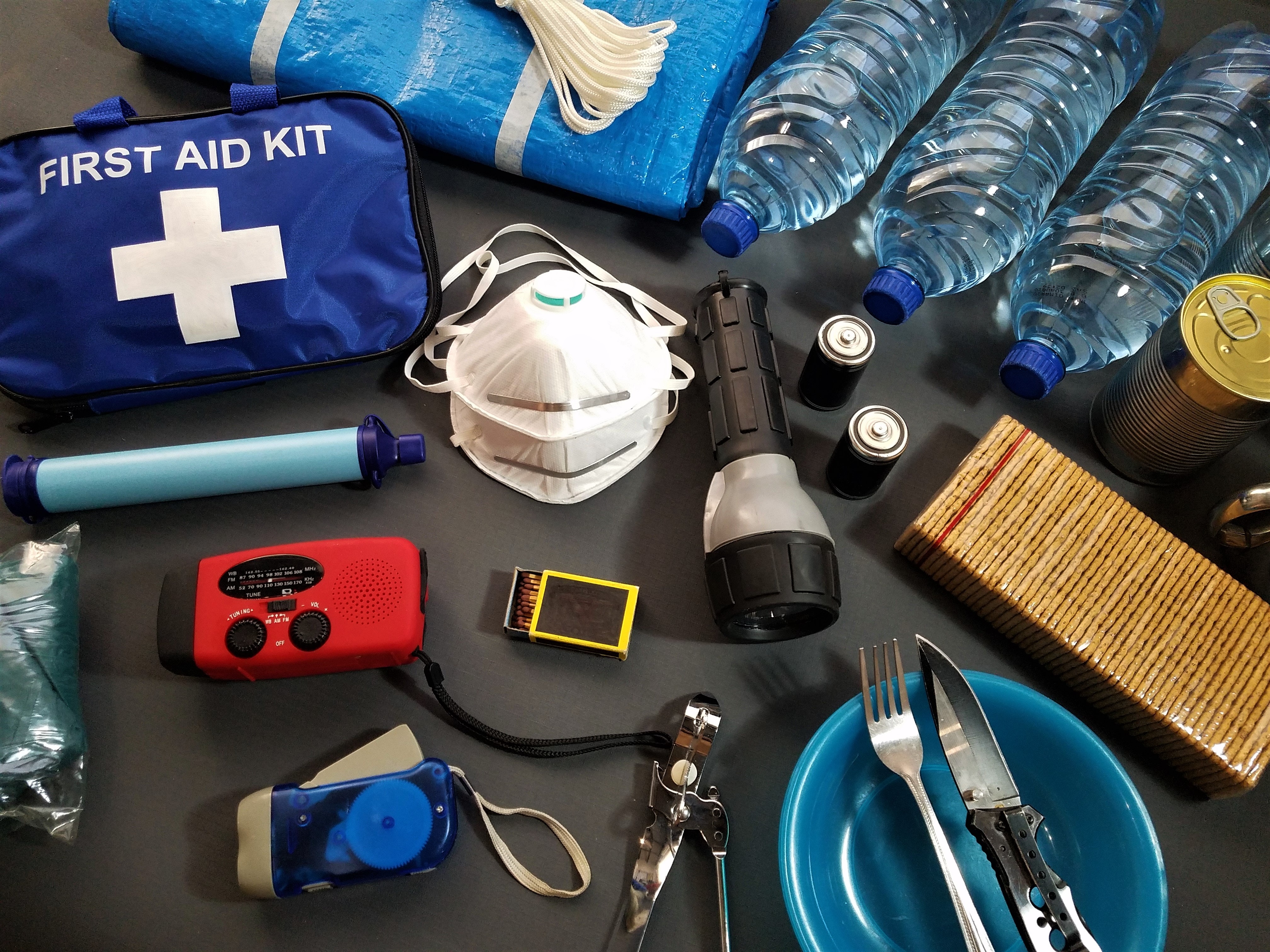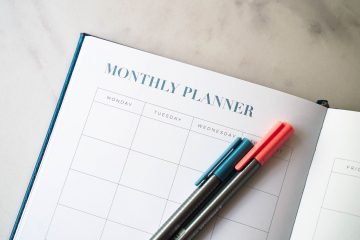
If an emergency personnel knocked on your door or you received a warning from a television news report to quickly evacuate your home would you be prepared?
According to the Center for Disease Control (CDC), only 39% of Americans have developed an emergency evacuation plan and discussed it with their family.
Most people are not prepared for extreme emergencies such as:
- Earthquakes
- Floods
- Gas leaks
- Hurricanes
- Tornadoes
- Pandemics
- Wildfires
The COVID pandemic in 2020 and the Texas Winter Storm in 2021 where many people endured extreme cold temperatures and were without electricity and water for several days has compelled me to be wise and prepared. My area in Texas was not hit as hard as other areas.
Organizing your Life, Home, and Office is Good Stewardship
Only God knows what the future holds or what disasters will occur. It is comforting to trust God in all situations.
Planning what to do before a disaster helps to protect you and your family.
The prudent see danger and take refuge, but the simple keep going and pay the penalty. (Proverbs 22:3 NIV)
Have a Plan
- Know what disasters are common in your area and how to prepare your home and family
- Learn community warning signs
- Know when you should shelter in place and where the safest place is in different emergencies
- Find escape routes in your home and evacuation routes in your community. Practice using these routes.
Be Prepared
Ready.gov states you may need to survive on your own for several days after an emergency and recommends 72 hours/3 days of non-perishable food, water, and hygiene supplies in an emergency.
What is a 72-Hour Emergency Kit?
Basic items your household will need to survive for at least 3 days if you have to suddenly evacuate your home or shelter in place.
How Much Does a Kit Cost?
You can purchase premade kits for $75 – $300 or make your own on a budget. I used many items I had at home and bought a few items for less than $50.
What Type of Storage to Use?
You may have to carry your kit if it is not safe to drive a vehicle. If children or elderly are a part of your household, be mindful that you may have to carry their kits in addition to yours.
Vehicle tip – keep at least a half of tank of gas in your car at all times. Gas stations may be crowded or out of gas in a crisis.
- Rolling luggage
- Backpack
- Military or fishing vest is optional for additional storage
- Kid’s military vest
- Money pouch for cash
- Quart size vinyl bag for hygiene products
Who Needs an Emergency Kit?
Everyone in your household – adults, children, and pets. Every household is unique. Prepare your kits for your specific needs.
Where to Store Your Emergency Kit?
- Closet near exits in your home
- Mudroom
- Entryway
- Cool, dark storage because of non-perishable food
What to Put in Your Emergency Kit?
Food Supplies
- Canned tuna or salmon with pop lid or pouches
- Soup with pop lid
- Can opener for canned goods with no pop lid
- Beef or turkey jerky
- Granola bars
- Peanut butter
- Fruit cups
- Dry fruit
- Nuts or seeds
- Baby food
- 1 gallon of water per person per day
- Napkins
- Paper plates & bowls
- Plastic utensils
Hygiene Supplies
- Hand sanitizer
- Feminine supplies
- Toothpaste & brushes
- Toilet paper
- Depends for elderly or special needs
- Hairbrush & comb
- Hair gel or moisturizer
- Shampoo & conditioner
- Diapers
- Shea butter or lotion
- Razor
- Soap
- Hand towels
- Deodorant
Emergency Supplies
- First aid kit
- Latex gloves
- Face masks
- Flashlights
- Pain medication
- Antacid
- Prescription medication
- Glasses
- Antiseptic
- Crank radio* the radio I purchased came with a flashlight and USB cord for cell phones. I have a Samsung phone which does not use a universal charger. Make sure the charger fits your phone if you purchase the radio in my link below
- Blanket
- Change of clothing
- Thermometer
- Matches
- Cell phone charger
- Cell phone
- Small garbage bags
Important Documents
- Copy of driver’s license or ID
- Copy of will
- Copy of social security card
- Copy of birth certificate
- House, car & office keys
- Medical records
- Cash
- Bank information
- **Keep items in a plastic bag in case of flood
Emergency Contacts
- Out of town friends or family
- Church
- Doctors
- Veterinarians
- County emergency
- Home management/leasing office
- Schools
- Banks
Pets
- Pet food, water & supplies
- Pet ID/Service animal ID
- Medications
Activities
- Bible
- Communion
- Games/activities for kids
- Paper & pencil
- Books
Natural, Non-Toxic Hygiene Products in my Emergency Kit
It is very important to take care of your spiritual, physical, emotional, and mental health in a crisis.
- I put 1 – 2 drops on my toothbrush for oral support
- I mix with a carrier oil (shea butter, olive oil, or almond oil) and rub on the bottoms of my feet and spine for Immune & respiratory support
- Lavender essential oil
- I rub on my temples, wrists or bottoms of feet for emotional support/support my nervous system. Lavender is my favorite sleep support oil
- Peppermint Vitality Essential Oil
- My favorite respiratory support oil. I rub on my chest or inhale directly from the bottle to support my breathing.
- I put 1 drop in a glass or metal water bottle for respiratory support. Young Living is the only brand I trust for essential oils that are safe to ingest. White labeled, our Vitality Line, is a dietary oil and safe for consumption.
- I rub peppermint on stiff joints
- Digize Vitality Essential Oil
- I use Digize for digestive support by rubbing 1 – 2 drops on my stomach or chest
- Grapefruit Essential Oil is one of my favorite oils to use as a natural deodorant. I mix it with a carrier oil, out a roller fitment on the bottle, and roll it on my armpits
- Thieves® Waterless Hand Sanitizer is plant-based, infused with essential oils, and kills 99.99 percent of germs on the go while leaving a sweet, spicy scent.
- Thieves Spray® is a fast and convenient way to clean and freshen hard surfaces at home and on the go.
- Lip balm This refreshing lip balm seals in moisture to prevent dehydration for smooth lips.
- Seedlings® Baby Wipes are ultra soft and comfortable. Great to use for kids and adults in an emergency to freshen up.
I put roller fitments on these oils and roll on my inner ankles to support my hormones. Video showing how to put roller fitments on bottles.
Natural, Non-Toxic Nutritional Supplements in my Emergency Kit
- Sulfurzyme capsules for bone, hair, skin, and nail support
- KidScents MightyPro Probiotics is my favorite probiotic to support my gut health. They taste like candy. Comes in pouches and for kids to enjoy.
- I use Essentialzymes to support my gut health
- NingXia Red my body needs NingXia daily. My energy level decreases if I don’t drink it.
Do Not Panic
If you are not prepared, do not panic. Get started today.
Being organized and prepared helps reduce stress in emergency situations.
Do You Need Help Choosing Your Supplies?
Check out items in my Amazon store
Get my 72-Hour Emergency Checklist to Prepare Your Kit on a Budget
Do You Need Help Getting Organized?
Click Here to Check Out my Organization Worksheets
Links on this blog are affiliate links. I will receive a small commission if you purchase from any of my links.
God bless you



0 Comments